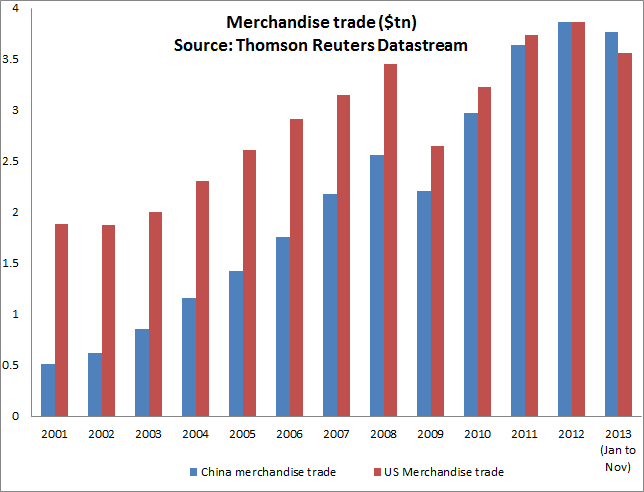I haven't really read the thread far back enough to understand what this argument is all about, but taking your post at face value:
1) Can the US survive without China? Yes. Our MNCs will simply relocate their manufacturing operations to other low-cost countries, or bring manufacturing back home (newly competitive with extremely low energy costs, increased robotics, and 3D printing). In addition, exports only comprise 14 percent of US GDP, and we run a severe trade deficit with China. In a sense, that means a disruption of trade with China would help our GDP from a purely mathematical point of view.
2) Does the US want China to collapse? Absolutely not, and there's a reason why the populists always call for China to be sanctioned for currency manipulation or IP theft, but the elites never do anything about it. That's because there is still a lot of money to be made by trading with China. As with #1, we could survive without China, but there is a difference between surviving and thriving. I choose thriving, thank you very much. Remember, we prefer to measure per capita GDP in PPP because it accounts for cost of living, and cheap imports from China reduce the cost of living. We might be able to pay more for more expensive alternatives, but the market has spoken: when given a choice, outside of a thin sliver of the elite, consumers prefer to pay less at a slight cost to quality, rather than pay more for higher quality. That's China's forte. If it weren't so, Japan would be the factory of the world, not China.
3) China is currently difficult to replace (i.e. why haven't we already moved manufacturing elsewhere?) for three reasons:
a) China has a disregard for human rights not found elsewhere. Chinese labor can be worked for longer, at lower wages, and at a scale that cannot be replicated. Good luck working Indonesian labor in the toxic conditions in which Chinese labor works, living in dorms so they can be summoned to the factor floor in a moment's notice. Not going to happen without riots. Incidentally, this is also the reason why manufacturing hasn't already transferred back to the US, since all of our other advantages (cheap energy, relatively good infrastructure, rule of law, proximity to the home market, etc.) would make us more attractive than China. But labor is a big issue, and until labor can be sufficiently replaced by robotics, it will remain China's ultimate weapon.
b) China has already built the manufacturing ecosystem (factories, suppliers, electrical grid, transport infrastructure) to make it an efficient manufacturing hub. The costs are sunk. To replicate this environment will take much investment and time. It can be done, but why spend the money if we have access to China?
c) China has a huge population and a huge economy in its own right, now. Why sacrifice the profits that this market can provide for the sake of non-allies (e.g. Vietnam) or resentful/non-dependable allies who won't even spend for their own defense (e.g. the Philippines)?
To the 30 years comment: no one knows what the world will look like in 30 years, so let's not waste time bragging about the size of our crystal balls.















